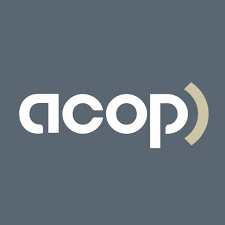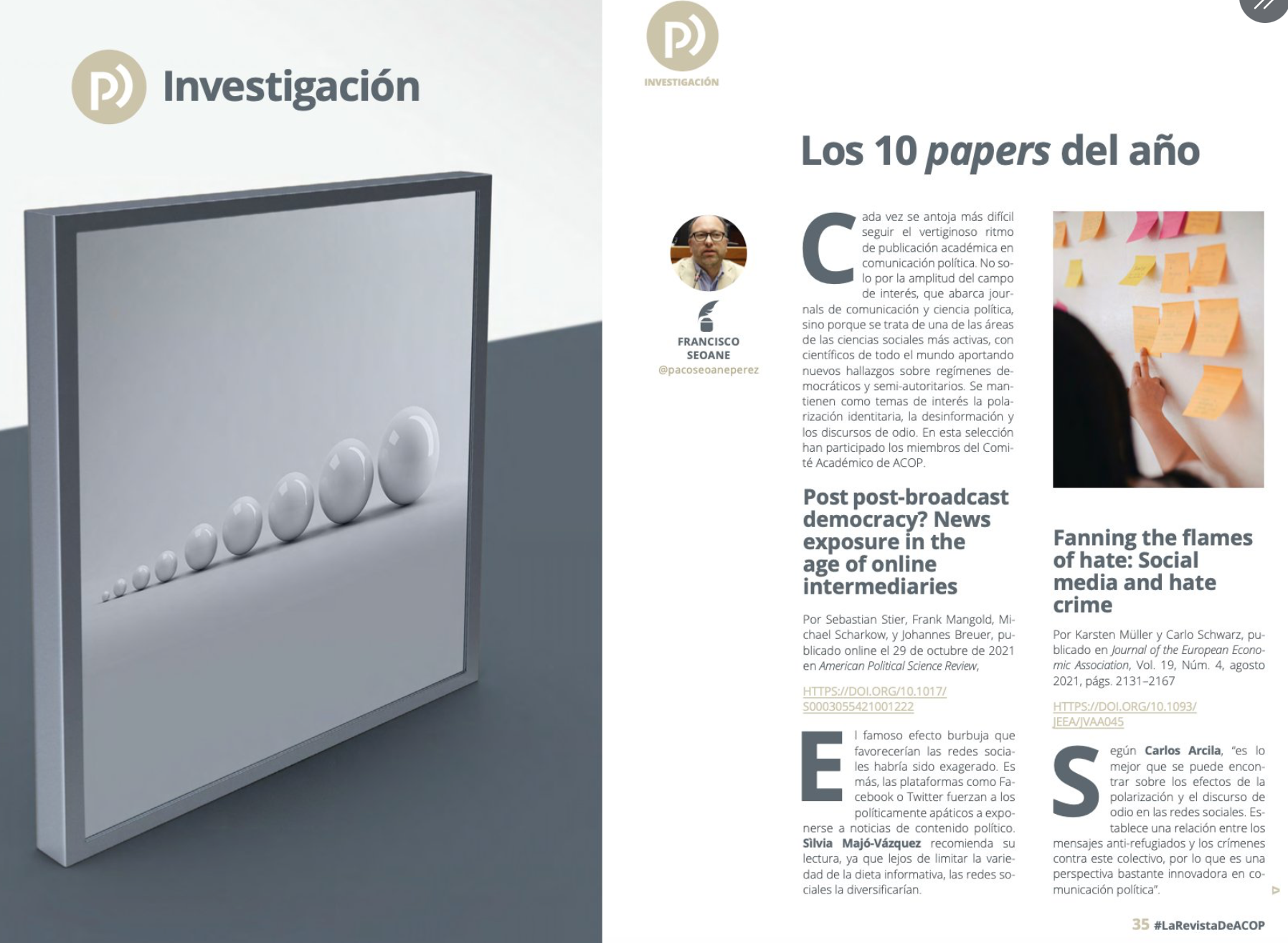ACOP Magazine Awards Article 'Perceived Credibility of Tweets by Opinion Leaders During the COVID-19 Pandemic in Spain'
ACOP Magazine Awards Article 'Perceived Credibility of Tweets by Opinion Leaders During the COVID-19 Pandemic in Spain'
ACOP Magazine Awards Article 'Perceived Credibility of Tweets by Opinion Leaders During the COVID-19 Pandemic in Spain'
The latest article, the result of research by the Chair, has been considered one of the ten best papers in Political Communication in 2021 by ACOP magazine.
The article 'Perceived Credibility of Tweets by Opinion Leaders During the COVID-19 Pandemic in Spain' is written by Reinald Besalú, Carles Pont-Sorribes and Aleix Martí and was published in the International Journal of Communication at Southern University California Annensberg.
International Journal of Communication [Scopus (Q1) and JCR (Q3) is an online, multimedia academic journal that adheres to the highest standards of peer review and involves established and emerging academics from anywhere in the world. The magazine was founded in 2007 and its editor-in-chief is Professor Larry Gross. The journal is affiliated with the USC Annensberg School of Communication and Journalism and public access to articles in the International Journal of Communication is free.
Credibility and Twitter
|

Front cover of the TOP 10 articles in Political Communication 2021 [click to the image to accesi]
This is the list of the 10 articles selected by the Academic Comitee of ACOP magazine:
- Fanning the flames of hate: Social media and hate crime, por Karsten Müller y Carlo Schwarz, publicado en Journal of the European Economic Association, Vol. 19, Núm. 4, agosto 2021, págs. 2131–2167, https://doi.org/10.1093/jeea/jvaa045
- Post post-broadcast democracy? News exposure in the age of online intermediaries, por Sebastian Stier, Frank Mangold, Michael Scharkow, y Johannes Breuer, publicado online el 29 de octubre de 2021 en American Political Science Review, https://doi.org/10.1017/S0003055421001222
- No polarization from partisan news: Over-time evidence from trace data, por Magdalena Wojcieszak, Sjifra de Leeuw, Ericka Menchen-Trevino, Seungsu Lee, Ke M. Huang-Isherwood y Brian Weeks, publicado online el 1 de noviembre de 202 en The International Journal of Press/Politics, https://doi.org/10.1177/19401612211047194
- Perceived credibility of tweets by opinion leaders during the COVID-19 pandemic in Spain, por Reinald Besalú, Carles Pont-Sorribes y Aleix Martí, publicado online el 29 de noviembre de 2021 en International Journal of Communication, Vol. 15, https://ijoc.org/index.php/ijoc/article/view/17743
- Coronavirus misinformation: quantifying sources and themes in the COVID-19 ‘infodemic’, por Sarah Evanega, Mark Lynas, Jordan Adams y Karinne Smolenyak, disponible en pre-print desde el 7 de octubre de 2021 en el Journal of Medical Internet Research, https://preprints.jmir.org/preprint/25143
- Distract and divert: How world leaders use social media during contentious politics, por Pablo Barbera, Anita Gohdes, Evgeniia Iakhnis y Thomas Zeitzoff, publicado online el 18 de agosto de 2021 por el Center for Open Science (Open Science Framework), https://osf.io/38mv7/
-
Short of suspension: How suspension warnings can reduce hate speech on Twitter, por Mustafa Mikdat Yildirim, Jonathan Nagler, Richard Bonneau y Joshua A. Tucker, publicado online el 22 de noviembre de 2021 en Perspectives on Politics, https://doi.org/10.1017/S1537592721002589
-
Commercial companies in party networks: Digital advertising firms in US elections from 2006-2016, por Bridget Barrett, publicado online el 22 de noviembre de 2021 en Political Communication, https://doi.org/10.1080/10584609.2021.1978021
-
Preaching to the choir? Rhetoric and identity in a polarized age, por Rob Goodman y Samuel Bagg, publicado online el 19 de noviembre de 2021 en The Journal of Politics, https://www.journals.uchicago.edu/doi/10.1086/715171
-
Policy or person? What voters want from their representatives on Twitter, por Nathalie Giger, Stefanie Bailer, Adrian Sutter y Tomas Turner-Zwinkels, publicado en diciembre de 2021 en Electoral Studies, Vol. 74, https://doi.org/10.1016/j.electstud.2021.102401
